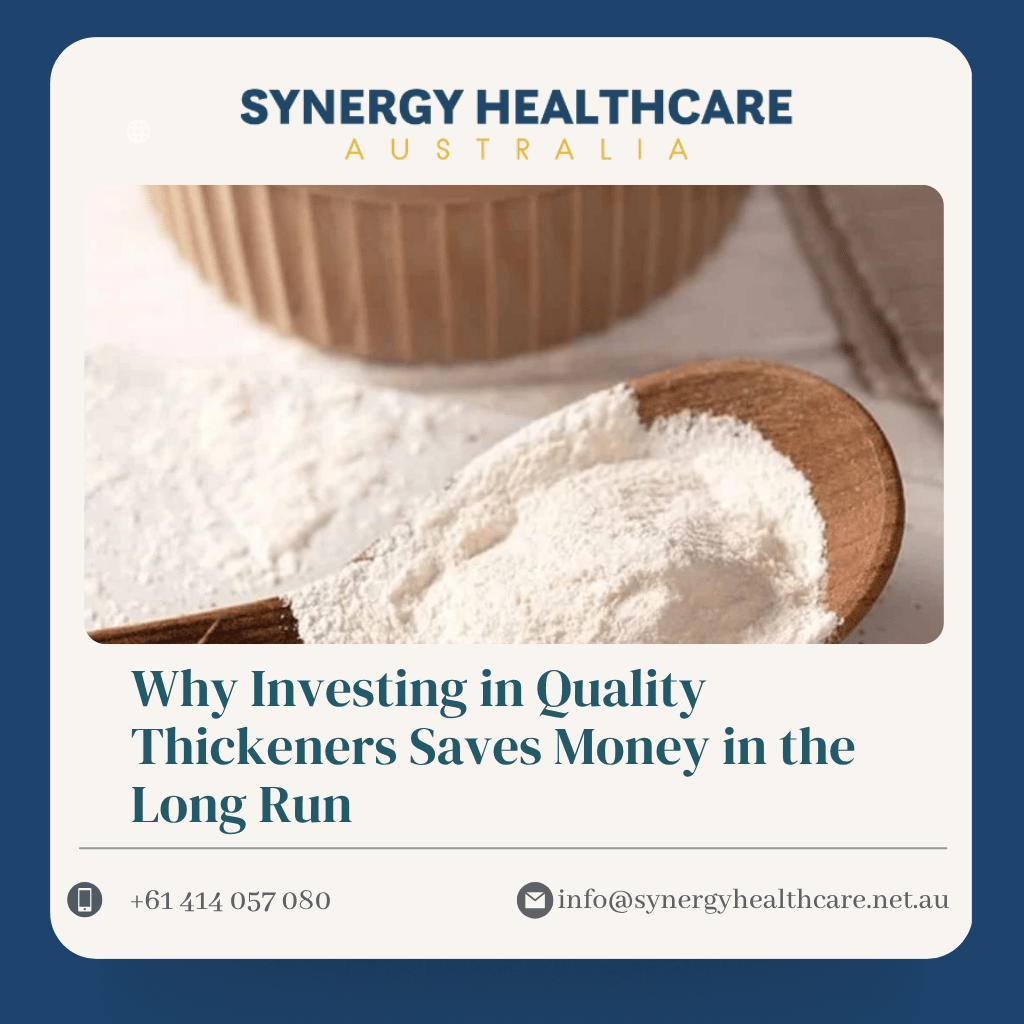Let’s be honest—when sourcing ingredients for food production, it’s tempting to go for the cheapest option. But when it comes to food thickeners, cheaper is not always better. At Synergy Healthcare, a trusted food thickeners supplier in Australia, we’ve seen firsthand how investing in high-quality thickeners can actually save businesses money over time—and improve product quality while you’re at it.
In this blog, we’ll walk you through why premium food thickeners are a smart investment for any Aussie food manufacturer, café, commercial kitchen, or food brand.
What Makes a Thickener “High-Quality”?
A high-quality thickener does more than just thicken—it’s consistent, effective, safe, and efficient. Here’s what to look for:
- ✅ Purity and concentration: More active product, less bulk filler
- ✅ FSANZ-approved: Safe for use under Australian food regulations
- ✅ Batch consistency: Performs the same every time
- ✅ Solubility and blendability: Mixes easily without clumping
- ✅ Shelf stability: Doesn’t degrade quickly in Aussie heat and humidity
These features might cost a little more upfront—but they save you in the long run.
Direct Cost Savings From Using Quality Thickeners
✅ Lower Dosage Required
Premium thickeners usually have higher potency, meaning you can use less product to achieve the same viscosity. That translates into lower cost per unit.
📊 For example, a high-grade xanthan gum may require only 0.3% inclusion in a sauce, whereas a lower-grade version might need 0.5–0.7% to achieve the same effect.
✅ Fewer Recipe Failures
Inconsistent thickeners cause batch failures, separation, and texture issues—which means:
- Extra time troubleshooting
- Costly reworks
- Product wastage
A consistent, high-quality thickener ensures less product goes to waste.
✅ Reduced Spoilage and Returns
Better texture and stability = better shelf performance. That means fewer returns or complaints from supermarkets and end customers.
Indirect Cost Savings & Operational Efficiency
✅ Improved Shelf Stability
A quality thickener helps maintain texture and moisture over time, reducing the need for extra preservatives or stabilisers.
Great for:
- Ready meals
- Frozen goods
- Dairy and plant-based alternatives
✅ Compatible With Packaging
Thickeners that don’t break down under packaging pressures (e.g., in vacuum-sealed or hot-fill systems) reduce product defects like weeping, syneresis, or layer separation.
✅ Faster Processing & Mixing
Thickeners that dissolve quickly and evenly lead to fewer clogs, shorter mix times, and less equipment strain—all of which impact energy, labour, and downtime.
Impact on Product Quality, Brand Image & Consumer Loyalty
Australian consumers are big on texture, mouthfeel, and consistency. In fact, according to a 2023 FMCG study, 72% of Aussies say they’d stop buying a product if the texture or consistency changed.
So when your product performs the same, batch after batch, you build:
- Consumer trust
- Fewer complaints
- Higher repeat sales
💡 Better ingredients = better perception. It’s a win-win.
Sustainability and Waste Reduction Benefits
Let’s not forget the environmental angle.
- ✅ Better yield = less ingredient waste
- ✅ Longer product shelf life = fewer expired goods
- ✅ Smoother production = less energy and resource use
A small upgrade in thickeners can support big sustainability goals, which is a growing priority in Australia’s food and beverage sector.
Real-World Example: Low-Grade vs High-Grade Thickener
| Feature | Low-Grade Thickener | High-Quality Thickener |
| Dosage | 0.6–0.8% | 0.3–0.4% |
| Mixing Time | 10–12 mins | 3–5 mins |
| Batch Consistency | Variable | Stable |
| Shelf Life Impact | Moderate | Excellent |
| Cost per kg | $12 | $18 |
| Cost per finished unit | Higher (due to overuse) | Lower overall |
So while the per-kg price is higher, your cost per batch is actually lower with the better-quality option.
Questions to Ask Before Choosing a Food Thickener Supplier
Before buying in bulk, ask:
- Is the thickener FSANZ-approved and food-grade?
- What’s the recommended usage rate per application?
- Can I get samples or trial support?
- Do you offer technical guidance for formulation issues?
- Can you guarantee batch consistency and documentation?
At Synergy Healthcare, we proudly answer “yes” to all of the above.
Why Work With Trusted Suppliers in Australia
When you work with a local, experienced food thickeners supplier in Australia, you get:
- Fast delivery and local stock
- Technical know-how on usage and compatibility
- Product compliance with Australian regulations
- Ongoing support as your business scales
Plus, it’s just easier to work with a team that understands Aussie market needs, climate, and compliance.
FAQs
Q1. Isn’t it cheaper to buy budget thickeners in bulk?
Not really. While the upfront cost might be lower, you’ll likely use more per batch, deal with performance issues, and see more waste.
Q2. What’s the average shelf life of a high-quality thickener?
Most premium food thickeners last 12–24 months when stored properly.
Q3. How do I know if a thickener is FSANZ approved?
Ask your supplier for documentation. All approved additives are listed in Standard 1.3.1 of the FSANZ Food Standards Code.
Q4. Can thickeners affect product flavour or colour?
If used correctly, most high-quality thickeners are neutral in taste and colourless.
Q5. Where can I buy quality food thickeners in Australia?
Synergy Healthcare is a leading food thickeners supplier in Australia, offering reliable, food-grade ingredients with expert support.
Conclusion
Investing in quality food thickeners isn’t just a matter of premium pricing—it’s about long-term savings, better product performance, and higher customer satisfaction. At Synergy Healthcare, we’re here to help you make the smart choice with FSANZ-approved, high-performance thickeners for all types of applications.
📞 Ready to upgrade your thickeners? Let’s chat. Our team can guide you through product options, testing, and supply planning—tailored to your food business needs.





